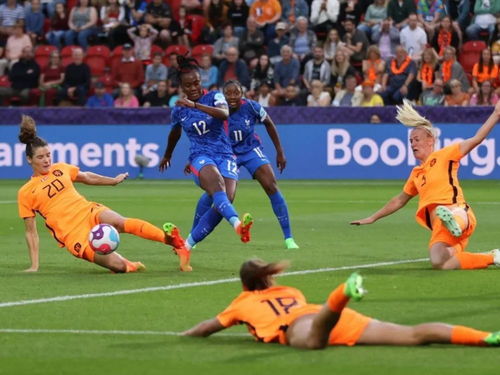TheCountdowntoGlory:AComprehensiveAnalysisoftheEuropeanChampionshipMatches
The European Championship, often referred to as the Euros, is one of the most prestigious football tournaments in the world. It brings together the best national teams from across the continent to compete for the coveted title of European champions. As we delve into the history and statistics of the Euros, we will explore the number of matches played, the evolution of the tournament, and the memorable moments that have shaped its legacy.
The inaugural edition of the European Championship took place in 1960, with just four teams competing in a knockout format. The tournament has since expanded, with the 2016 edition featuring 24 teams and a total of 51 matches. To date, there have been 15 official European Championship tournaments, with the 16th edition scheduled for 2020 (held in 2021 due to the COVID19 pandemic).
To calculate the total number of matches played in the Euros, we must consider the format changes over the years. The early tournaments had fewer matches due to the smaller number of participating teams. For instance, the 1960 and 1964 editions had only four and eight teams, respectively, resulting in just five and eight matches. The tournament expanded to include 16 teams in 1996, leading to a significant increase in the number of matches.
From 1996 to 2012, the Euros featured 31 matches, including the final. This format consisted of a group stage with four groups of four teams, followed by a knockout stage that included quarterfinals, semifinals, and the final. The introduction of 24 teams in 2016 added an extra round of matches, with the group stage now including six groups and the knockout stage expanded to include a round of 16.
As of the end of the 2016 tournament, the total number of matches played in the Euros stands at 312. This figure includes all group stage matches, knockout stage matches, and the final. The 2020 (2021) tournament will add another 51 matches to this tally, bringing the grand total to 363 matches.

The evolution of the European Championship has not only increased the number of matches but also the level of competition and the global interest in the tournament. The expansion to 24 teams has allowed more countries to participate and has created a more inclusive and diverse competition. This change has also led to more matches being played, providing fans with more opportunities to witness the excitement and drama of the Euros.
Throughout the history of the Euros, there have been countless memorable matches that have left an indelible mark on the hearts of football fans. From the nailbiting final of 1976, which saw Czechoslovakia defeat West Germany in a penalty shootout, to the incredible comeback of Greece in 2004, when they defied all odds to win the championship, the Euros have consistently delivered unforgettable moments.
The 2016 tournament, in particular, was filled with thrilling matches and surprising results. The group stage saw the elimination of traditional powerhouses such as Italy and Netherlands, while underdogs like Iceland and Wales made their mark on the competition. The knockout stage provided even more drama, with Portugal's journey to the final being a testament to the unpredictability of the Euros.
As we look forward to the 2020 (2021) European Championship, we can expect more of the same excitement and unpredictability that has come to define the tournament. With 51 matches to be played, fans will be treated to a feast of football, as the best teams in Europe battle it out for the ultimate prize.
In conclusion, the European Championship has come a long way since its inception in 1960. The tournament has grown in size and stature, with the number of matches played increasing alongside the level of competition. As we approach the 363rd match in the history of the Euros, we can reflect on the rich history and the unforgettable moments that have made the tournament one of the most cherished in the world of football.
体育资讯
MORE>-
02-23DeepSeek,探索你的安全感,究竟需要多少钱?
-
02-23雄鹿与凯尔特人的对决,篮球赛场上的传奇对决与智慧较量
-
02-23德甲球队之间的微妙平衡,竞技、友谊与合作关系的交织
-
02-23乌克兰稀土真相揭秘,探寻资源背后的真相
-
02-23揭秘全明星名人赛,一场星光熠熠的体育与娱乐盛宴
-
02-23浙江人家中的温馨雪人梦
-
02-23足球世界的奇遇,乌拉圭与加纳——碰撞中的荣耀与挑战
-
02-23东亚杯上的足球较量,中澳对决,技术与意志的较量
-
02-23菲尔普斯的泳池传奇,探索蝶泳的魔法与技巧
-
02-23揭秘欧洲篮球瑰宝,比利时女篮——坚韧与荣耀的完美结合
-
02-23火箭22连胜,火箭队的超级马拉松与篮球界的新里程碑
-
02-23难哄中的性骚扰不该成为流量密码
-
02-23人与10辽足,足球魅力下的社区融合与传承
-
02-22揭秘U22亚洲杯,足球版的青春风暴,未来之星的磨砺场
-
02-22揭秘德甲赛场,那些熠熠生辉的球队与他们的传奇故事
- 搜索
- 最近发表
-
- 从舞台到现实,一位勇敢的女士在角色扮演中的故事与启示
- 提升自我,深度解析单节37分背后的教育启示
- DeepSeek,探索你的安全感,究竟需要多少钱?
- 音乐双子星,张玉宁与曲乐恒,点亮足球场上的音符魔力
- 痛失巨匠,修波专家不幸辞世,交通安全的警钟长鸣
- 霍华德,篮球殿堂的盖帽大师——揭秘他的十佳时刻
- 两岁男童托育园午睡时身亡,死因公布引发的社会反思
- 揭秘乒乓球世界排名,策略与技巧的深度解析
- 王一博,热烈人生的不断超越与闪耀第一的光芒
- 回溯篮球之巅,2012年NBA总决赛的激情与荣耀
- 警惕无声的健康杀手,癌症的早期预防与发现
- 雄鹿与凯尔特人的对决,篮球赛场上的传奇对决与智慧较量
- 特朗普撤换美军最高将领,决策背后的战略考量与影响
- 德甲球队之间的微妙平衡,竞技、友谊与合作关系的交织
- 替身女演员受伤,漂白剧组深表歉意
- 深度解析,新浪NBA中文网——篮球爱好者的全方位资讯宝库
- 悲剧交织,美女网红英勇救人后溺亡,母亲不幸遭遇车祸
- 全球视野下的足球风暴,国际搜狐体育带你揭秘世界足坛的风云变幻
- 乌克兰稀土真相揭秘,探寻资源背后的真相
- 揭秘全明星名人赛,一场星光熠熠的体育与娱乐盛宴





